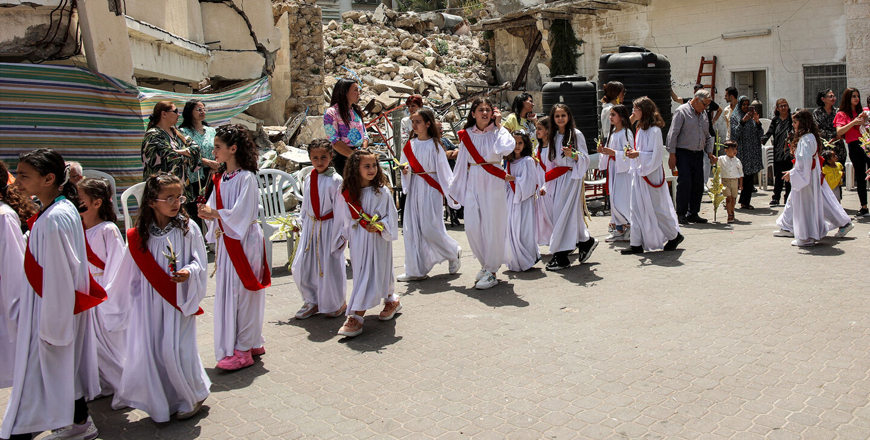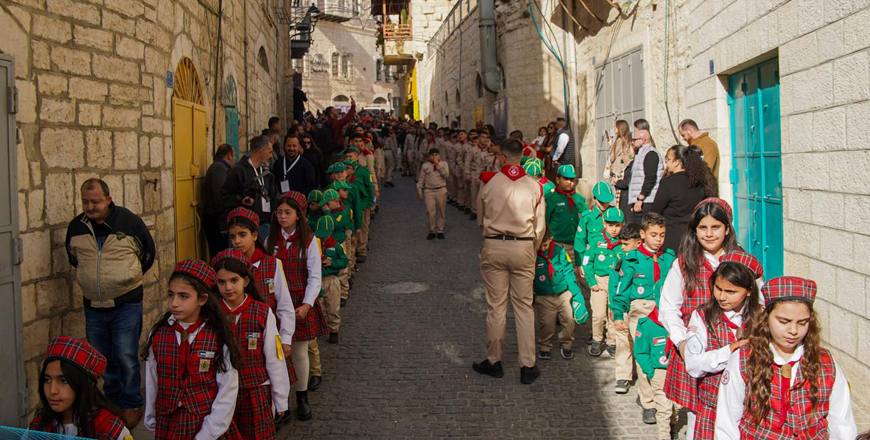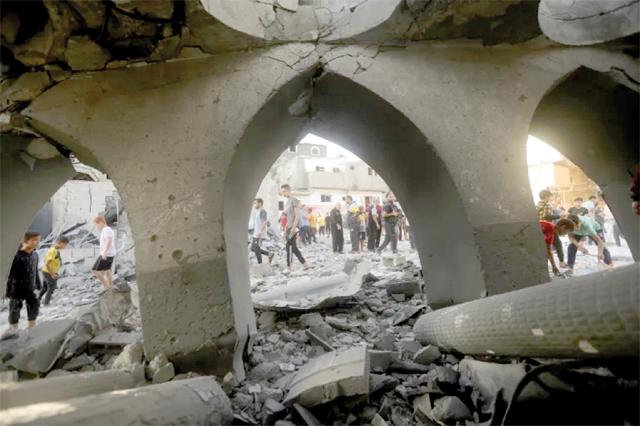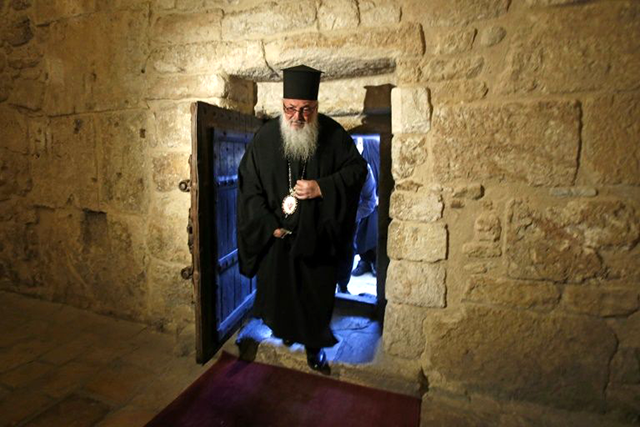You are here
‘Gaza’s 2000 year-old Christian community could completely disappear’
By Sophie Constantin - Aug 12,2024 - Last updated at Aug 12,2024

Child deaconesses walk past the rubble of a collapsed building in a procession during the Palm Sunday service outside the Greek Orthodox Church of St Porphyrius in Gaza City on April 28, 2024 (AFP photo)
AMMAN — Palestine, a land deeply intertwined with the roots of Christianity, is where the earliest Christian communities emerged, stemming from the followers of Jesus of Nazareth. Yet, today Gaza’s Christian community stands on the brink of extinction.
The identity of Christian Palestinians
Christian Palestinians trace their origins back to the first Aramaic-speaking Jewish converts, who were later joined by Latin and Greek-speaking Romans, Greeks and descendants of various people, including Phoenicians, Aramaeans, Arabs, among others, as noted by the scholar Gerd Theisen, theologist of the New Testament.
Following the Muslim conquest, many non-Arabic-speaking Christians gradually adopted Arabic, blending into the broader Arab Christian identity, alongside communities like the Arab Ghassanids, who remained Christian and integrated with Melkite and Syriac communities across the region, explained the historian Nur Masalha in a paper for the Centre of Palestine Studies at the University of London.
Today, Palestinian Christians represent a rich tapestry of denominations, including Eastern Orthodoxy, Oriental Orthodoxy, Catholicism (including both Latin and Eastern Rites) and Protestantism, forming a small yet significant part of the Palestinian population.
Population decline
The creation of Israel in 1948 marked a turning point for Palestinian Christians, who, like their Muslim compatriots, faced displacement and the harsh realities of life under occupation. According to Minority Rights Group International, as cited by the UN Refugee Agency (UNHCR), the Christian population has significantly reduced due to emigration and lower birth rates, from an estimated 10 per cent of the population in 1948 to around 2 per cent today.
The Palestinian Bureau of Statistics census recorded approximately 47,000 Christians living in Palestine in 2017, with nearly 98 per cent residing in the West Bank, in cities like Ramallah, Bethlehem, Jerusalem, while the remaining 1,100 lived in besieged Gaza. Today, that number has been reduced to less than 800 in Gaza, according to International Christian Concern, a human rights organisation focused on assisting persecuted Christians globally.
Despite their diminishing presence, Christians remain an integral part of Palestinian society: They have representation in the Palestinian Authority government, and Christian children attend separate religious classes in schools, with family law matters overseen by Christian ecclesiastical courts. They share the same struggles as their Muslim neighbours, enduring the challenges imposed by Israeli occupation.
The construction of the Israeli separation wall in the early 2000’s has further isolated Christian communities, particularly in Bethlehem, complicating their access to religious sites and contributing to the fragmentation of this already small minority, as reported by the US Commission on International Religious Freedom.
Bethlehem, the birthplace of Jesus Christ, had a Christian majority of 86 per cent just 70 years ago, but the city’s demographics have significantly shifted, especially after the Israeli occupation of the West Bank in 1967, and the construction of the Israeli separation wall. The “Open Bethlehem” organisation described how the wall has encircled Bethlehem, cutting it from Jerusalem and reducing Palestinian access to the land, with only 13 per cent of the Bethlehem district remaining available for Palestinian use.
Escalating violence on Christians
The ongoing conflict has intensified the plight of Palestinian Christians. Pope Francis has condemned the Israeli military actions in Gaza as “terrorism tactics”, highlighting the tragic deaths of two Christian women (Nahida Khalil Anton and her daughter Samar) who had taken refuge in the Holy Family Parish Church. They were shot dead by Israeli snipers while they were walking to a convent of nuns. The same day, the convent of Sisters of Mother Teresa, part of the church compound, was struck three times by Israeli artillery shells, rendering the monastery unhabitable, as reported by the Latin patriarchate.
“I continue to receive very grave and painful news from Gaza,” Pope Francis said in an appeal for ceasefire. “Unarmed civilians are the objects of bombings and shootings. And this happened even inside the Holy Family Church, where there are no terrorists, but families, children, people who are sick or disabled, and nuns.”
In a further act of violence, the third oldest church in the world, Saint-Porphyrius Orthodox Church was damaged by Israeli bombings. When questioned about the incident during a talk with the LBC British radio station, the Israeli deputy major of Jerusalem, Fleur Hassan-Nahoum, claimed “There are no church in Gaza, and no Christians,”highlighting the invisibility of Christian Gazans.
Targeting churches
Saint Porphyrion Orthodox Church was hit by an Israeli airstrike, resulting in the death of at least 18 Christians sheltering there. The Greek Orthodox Patriarchate of Jerusalem condemned the attack, labelling it as a war crime.
Gaza’s only Baptist church met a similar fate when it was destroyed by an Israeli tank shell just a day after Christmas 2023. Additionally, the Byzantine church in Jabalia, Northern Gaza, faced complete destruction due to direct shelling during an Israeli assault, as reported by the NGO Heritage for Peace. The Saint Hilarion monastery in Deir Balah, the first Christian monastery built in Palestine during the Byzantine era, was also partially damaged from indirect shelling.
Ahli Hospital, the only Christian hospital in the Gaza Strip, run by the Anglican Church, was also severely damaged by a devastating explosion that killed hundreds of people on October 17 2023, according to Human Rights Watch. The hospital had already suffered damage from another Israeli missile three days before the deadly blast.
Leaving their ancestral homes
The relentless war and blockade have accelerated the exodus of Christians from Gaza. The International Christian Concern has warned that the Christian community in Gaza, now reduced to less than 800, could disappear entirely if the current situation persists. As Israeli airstrikes continue to devastate Gaza, churches, hospitals and ancient Christian sites face destruction, threatening the survival of this ancient community.
“They are faced with the dilemma of staying and helping others rebuild or leaving to join relatives abroad and start a new life, but the journey out of Gaza is not an easy one,” the organisation stated.
The demolition of Christian areas in the West Bank remains a serious concern. The Minority Rights Group International, via UNHCR, reported that in 2016, construction began on a new section of the separation barrier near the Palestinian Christian town of Beit Jala, threatening to cut Palestinians off from their olive groves, a vital source of livelihoods, to facilitate the expansion of the nearby Israeli settlement of Gilo.
In June 2024, during an International Peace Consultation, the National Coalition of Christian Organisations in Palestine issued an open letter to the World Council of Churches, stating, “There is no justice in our land. In today’s Palestine, discrimination and inequality, military occupation and systematic oppression are the rules.” The letter urged churches worldwide to recognise Israel as an apartheid state and to take a firm theological stand against any doctrine that justifies this occupation.
“We are on the verge of a catastrophic collapse,” the letter warned. “As Christian Palestinians, this could be our last chance to save the Christian presence in this land.”
The end of a 2000 years old community
Palestinian State Minister of Foreign Affairs and Diaspora Varsen Aghabekian Shahin, who is of Armenian origin, highlighted the gravity of the situation during her meeting with a delegation from Churches for Middle East Peace. “Israel killed 3 per cent of Gaza’s Christians since October,” she told the gathering.
For the first time in their 2000-year history, Gaza’s Christians face the real possibility of extinction. As the community’s numbers steadily decline and their historical heritage stands under constant assault, the future of Christianity in Palestine hangs in the balance.
“Almost all Christian institutions in Gaza have suffered destruction or damage, Christians have lost their homes and businesses,” Mitri Raheb, a Palestinian pastor and founder of Dar Kalima University in Bethlehem, stated in international press. “I am afraid the last chapter of Christianity in Gaza is being written.”
Related Articles
AMMAN — Bethlehem, the sacred birthplace of Jesus Christ, holds profound significance for Christians worldwide.
AMMAN – Amidst the unfolding tragedy in Gaza, international organisations have released detailed reports on the deliberate destruction of Pa
BETHLEHEM, Palestinian Territories — Bethlehem's Church of the Nativity, built on the spot where Christians believe Jesus was born, reopened














